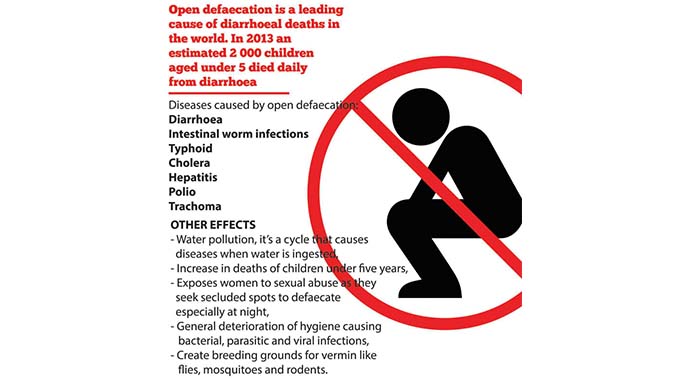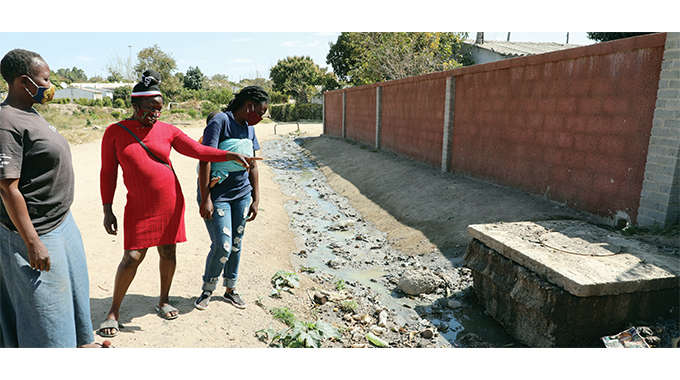Water crisis: residents turn to bush toilets

Nqobile Tshili, Chronicle Reporter
THE Bulawayo water crisis has resulted in an increase in open defaecation as residents opt for the bush to avoid dealing with messy toilets.
The practice that is spreading, especially in western suburbs, could compound the Covid-19 calamity by causing an outbreak of other diseases.
According to the World Health Organisation (WHO), open defaecation is a leading cause of diarrhoeal deaths in the world.
In 2013, worldwide, an estimated 2 000 children aged under 5 years died daily from diarrhoea.
Most bushy areas in high density suburbs have become smelly as residents use them to relieve themselves.
Footpaths through secluded areas are no longer usable due to the strong stench of human excreta.
Diarrhoea, intestinal worm infections, typhoid, cholera, hepatitis, polio and trachoma are among the diseases that can result from open defaecation.
It pollutes water sources and can cause death as happened in Luveve suburb recently when a burst sewer pipe contaminated drinking water leading to the death of at least 13 residents.
The world over, relieving oneself in the open has been proved to increase deaths of children under five years, expose women to sexual abuse as they seek secluded spots to defaecate, especially at night.
It also results in general deterioration of hygiene causing bacterial, parasitic and viral infections.
Residents have blamed the water crisis, as high lying areas have not received water for more than six months, for open defaecation.
The bush near the Bulawayo Provincial Heroes Acre is littered with tissue paper and is often abuzz with green flies feasting on waste.
Residents admit that they send children into the bush as they cannot afford to “waste” water by flushing toilets at home.
Environmentalists have said open defaecation could lead to a health disaster in the city, especially when the rainy season commences in about two months.
The Bulawayo City Council is struggling to provide residents with water due to a climate change-induced crisis that has resulted in three of the six supply dams being decommissioned.
Currently, the city’s water pumping capacity has dropped to nearly 65 megalitres (ML) per day against the city’s daily demand of about 155ML.
This has resulted in council imposing a gruelling 144-hour weekly water shedding regime citywide.
Residents told a Chronicle news crew that they have to make hard and humiliating decisions including open defaecation as they adapt to the water crisis.
Mai Faith Toronga from Nkulumane suburb said she sends all her minor children to the bush for toilet business.
“I’ve a lot of children that I stay with so I just tell them that whenever they want to relieve themselves, they go to the bush. However, I don’t use the bush. I try to conserve my bathing water and use it to flush. I know that sending the children to the bush is recipe for a health disaster. Flies can carry human waste back to the house and contaminate our food. But it’s just the same with the children using the toilet as we don’t have water. So, we’d rather deal with flies coming from the bush, instead of inviting them through a dirty toilet,” she said.
The woman looked utterly exhausted as she stood in queue for water from a council bowser.
Another resident, Ms Nomalanga Ncube, said passing through the bush can affect your appetite.

Ms Nomalanga Ncube
“It’s too smelly, you won’t eat after using those paths. Residents are forced to use the bush to relieve themselves due to the water crisis. Boreholes are too far from some residential homes and they are always long queues. At boreholes, where I fetch water; an individual is only allowed to draw 80 litres. That water cannot be enough for cooking, bathing and washing. So, residents just opt to use the bush to save water. It’s not just children who are using the bush, even adults do so,” said Ms Ncube.
She said council should consider drilling more boreholes.
Mrs Resta Gapare said residents have to violate lockdown regulations including the curfew just to queue for water.
“People leave their homes at 4AM just to fetch water. Recently, my children had diarrhoea and I suspect it was due to the water. I used the sugar and salt solution and they recovered. The water crisis needs to be addressed, especially when one of the Covid-19 requirements is that people wash their hands using running water,” said Mr Gapare.

Ms Resta Gapare
Environmental Management Agency (EMA) Bulawayo provincial manager Mr Decent Ndlovu said the rise in open defaecation was a crisis waiting to explode.
“Open defaecation is caused by council’s failure to provide water. Residents litter the bush with toilet paper and human waste. The human waste itself can also cause pollution as it is just the same as discharging raw effluent into the environment. Healthwise this may cause diseases such as cholera, typhoid and dysentery,” said Mr Ndlovu.
“As EMA we are really concerned, considering the population involved in this. As we head towards the rainy season, the waste will be wet and flies will carry it to homes. When the waste is washed away, it can even contaminate our water table causing diseases and could even affect downstream communities. The truth is that this is going to cause a lot of suffering. We should brace ourselves for the worst as we are going to the rainy season.”
He said residents should avoid using the bush as the water crisis requires that everyone plays their part to avert disaster.
Bulawayo mayor Councillor Solomon Mguni said if the water crisis is not managed properly it can lead to another outbreak of waterborne diseases.
“There are obvious dangers of the outbreak of gastrointestinal diseases which may leave a trail of destruction. We urge residents to exercise extreme caution and store adequate water when it is restored while others utilise borehole water to flush their toilets,” said Cllr Mguni.










Comments